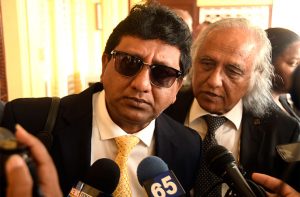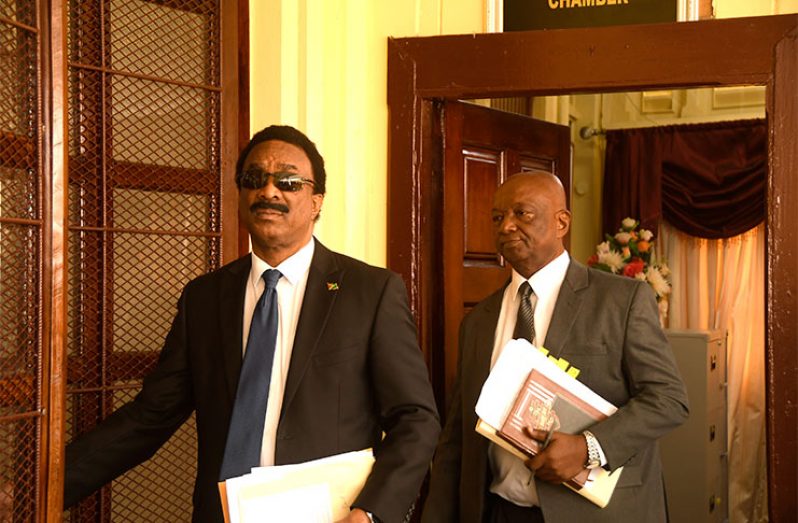…PPP, Ram forced to withdraw application for court to set elections date
…AG calls on opposition to return to Parliament to extend time
AN attempt by the opposition to stop house-to-house registration failed on Tuesday when Chief Justice (ag) Roxane George-Wiltshire refused to grant a conservatory order to halt the data gathering process, however, the substantive matter challenging the legality of it, will continue.
The Conservatory Order was sought by Chartered Accountant and Attorney-at-Law, Christopher Ram, in a matter brought against the Chief Elections Officer and the Commissioner of National Registration, Keith Lowenfield; the Guyana Elections Commission (GECOM); and the Attorney General, Basil Williams.
In the application filed on Monday by Attorneys-at-Law, Anil Nandlall and Ralph Ramkarran, Ram asked the High Court to grant a Conservatory Order prohibiting the Elections Commission, the Chief Elections Officer and the Commissioner of National Registration from conducting or continuing the process of house-to-house Registration, which commenced on Saturday July 20.
But on Tuesday, the Chief Justice (ag) threw out the application when she addressed the matter in Chambers. As part of that application, Ram, through his attorneys, had asked the High Court to issue an order compelling the Chief Elections Officer and the Elections Commission to immediately take all necessary actions to hold General and Regional Elections on or before September 18, 2019, but this was withdrawn.
In another Fixed Date Application (FDA) filed by Ram, the constitutionality of the ongoing house-to-house registration is being challenged on the grounds that it is in violation of Article 106 (6) and Article 106 (7) of the Constitution, and the letter and spirit of the judgment and consequential orders of the Caribbean Court of Justice (CCJ) in the consolidated appeals. Though the Chief Justice (ag) did not rule on this particular case on Tuesday, she said it lacked supporting evidence.
Before the court, the Chief Justice (ag), in addressing the substantive case, asked the attorneys representing Ram to resubmit the Fixed Date Application by 16:15hrs on Tuesday July 23, 2019. The respondents in matter – the Chief Elections Officer, GECOM and the Attorney General – were given up to July 29, 2019 to respond. However, Lowenfield’s Lawyer, Senior Counsel Neil Boston, had lobbied the court for 14 days to file his Affidavit in Defence, contending that there was no need to rush the case, but the Chief Justice held fast to her July 29, 2019 submission date. The matter will come up before the Chief Justice again on August 2, 2019.

(Photos by Adrian Narine )
At his Carmichael Street Office, the attorney general, who had appeared in the High Court with a battery of lawyers inclusive of the Solicitor General Nigel Hawke, confirmed that the Chief Justice refused to grant a Conservatory Order blocking the conduct of house-to-house registration.
He said Nandlall, in buckling under pressure, had no other choice than to withdraw the application for the court to issue an order compelling GECOM and its officers to conduct General and Regional Elections by September 18, 2019 because the CCJ has already ruled on it.
“If the CCJ wanted to make a ruling, they would have done so. If the CCJ wanted to make a ruling that elections should be held by the September 18, they would have done so. If they wanted to make a ruling that we must hold elections within three months, they could have done so but they didn’t because that would be a breach of the doctrine of the separation of powers,” the attorney general told reporters.
Ram and the Leader of the Opposition, Bharrat Jagdeo, had asked the CCJ to order that elections be held within three months from June 18, 2019 – the day that the court validated the December 21 vote of no-confidence against the government. But the CCJ, in upholding the submission of attorney general, ruled that only the President, the National Assembly, and implicitly GECOM can set timelines and a date for elections.
The President of the CCJ, Justice Adrian Saunders, in handing down those consequential orders on July 12, said the court lacks the power to set a timeline or day for the holding of elections, explaining that the Constitution places that power in the ‘hands’ of the President, the National Assembly, and indirectly GECOM. In ‘rejecting’ the submission of the opposition leader, the court said it simply cannot issue coercive orders or detailed directives dictating how the President and the National Assembly should act.
“It is not, for example, the role of the court to establish a date on or by which the elections must be held, or to lay down timelines and deadlines that, in principle, are the preserve of political actors guided by constitutional imperatives. The court must assume that these bodies and personages will exercise their responsibilities with integrity and in keeping with the unambiguous provisions of the Constitution, bearing in mind that the no-confidence motion was validly passed as long ago as 21 December 2018,” Justice Saunders explained.
Minister Williams, on Tuesday, maintained that the judgments and pronouncements of the CCJ are clear, and Ram’s application to the High Court to compel the conduct of elections, can be seen as an attack on the CCJ.
Weighing in on the matter of election, the attorney general said because the three month period, stipulated in Article 106 (7), for the conduct of elections, following the passage of a no-confidence motion, elapsed while the matter was still engaging the attention of the courts, it is now for the parliamentary parties – the A Partnership for National Unity + Alliance For Change (APNU+AFC) and the People’s Progressive Party/Civic (PPP/C) to return to the National Assembly and by a two-thirds majority vote, extend the time.
He added there is nothing in the Constitution that states that the extension should be for another three months. “There is no limit on the period of extension when you go for a two-thirds, because by then, you would have GECOM, all the main constitutional actors getting together, [and] Leader of the Opposition, and you arrive at a definitive date for elections,” he explained.
The opposition has repeatedly stated that it will not return to the Assembly to extend the time but the Attorney General remains hopeful that good sense will prevail. He said if this extension is not granted, the President would be required to proclaim a date for elections, in accordance with GECOM’s advice.
On the corridors of the High Court following the adjournment of the case, Nandlall, in the presence of his client Christopher Ram, confirmed that the CCJ did not grant the Conservatory Order to block the continuation of house-to-house registration. He also confirmed that the CJ was dissatisfied with the affidavit filed in the substantive case, and asked that it be resubmitted with the required evidence.
“She (the Chief Justice) wants more evidence to persuade her, that this exercise that GECOM is embarking upon will take us beyond that time frame (for elections),” Nandlall explained.
He maintained that the ongoing house-to-house registration contravenes the National Registration Act and goes against the orders of the CCJ because it will prevent elections from being held before September 18, 2019. However, while Nandlall, and by extension the opposition, is maintaining that election must be held within three months of the CCJ’s ruling, the CCJ did not order GECOM to hold election or specified a timeframe within which elections should be held.



.jpg)









